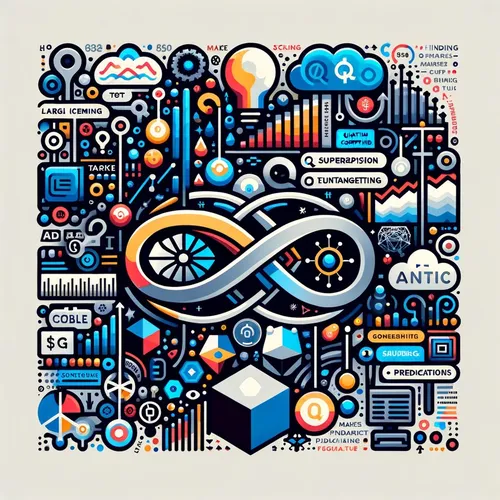Merck's Quantum Leap: IonQ Partnership Accelerates Drug Discovery Revolution
- Author
- Inception Point Ai
- Published
- Sat 22 Mar 2025
- Episode Link
- https://www.spreaker.com/episode/merck-s-quantum-leap-ionq-partnership-accelerates-drug-discovery-revolution--65033297
This is your Quantum Market Watch podcast.
Welcome to Quantum Market Watch, I'm Leo, your Learning Enhanced Operator. Today, we're diving into a groundbreaking announcement from the pharmaceutical industry that's set to revolutionize drug discovery through quantum computing.
Just yesterday, Merck unveiled its partnership with IonQ to leverage quantum algorithms for simulating complex molecular interactions. As I stand here in our quantum lab, watching the pulsing lights of our latest quantum processor, I can't help but feel a surge of excitement about what this means for the future of medicine.
Imagine standing in front of a massive quantum computer, its cryogenic cooling systems humming softly in the background. The air is crisp and clean, filled with the faint scent of electronics and liquid helium. This is where the magic happens - where we're able to model molecular structures with unprecedented accuracy, potentially slashing years off the drug development process.
Merck's announcement comes hot on the heels of last week's quantum breakthrough at MIT, where researchers demonstrated quantum entanglement between atoms separated by a record-breaking distance of 100 kilometers. These advancements are pushing us closer to the quantum internet, a development that could revolutionize secure communications across industries.
But let's focus on pharma for a moment. Traditional drug discovery is like searching for a needle in a haystack - actually, it's more like searching for a specific needle in a pile of slightly different needles. Quantum computing changes the game entirely. It's as if we've developed a magnet that can instantly identify and pull out the exact needle we need.
The key lies in quantum superposition and entanglement. These phenomena allow quantum computers to explore multiple molecular configurations simultaneously, a task that would take classical computers eons to complete. It's like being able to parallel park in every possible spot in New York City at the same time - and then instantly knowing which spot is perfect.
Merck's quantum-powered drug discovery platform could accelerate the identification of potential drug candidates for diseases ranging from cancer to Alzheimer's. We're talking about reducing a process that typically takes years down to mere months or even weeks. The implications for global health are staggering.
But it's not just about speed. Quantum simulations can provide insights into drug-target interactions at a level of detail previously thought impossible. This could lead to more effective, personalized treatments with fewer side effects. It's as if we've upgraded from a fuzzy black-and-white TV to a 16K ultra-high-definition display when looking at molecular interactions.
Of course, we're still in the early days. Quantum computers are notoriously finicky beasts, requiring extreme conditions to maintain their quantum states. It's like trying to conduct a symphony orchestra where each musician is suspended in a bubble of near-absolute zero temperature. One stray photon, and the whole performance falls apart.
Yet, the potential is undeniable. As quantum hardware continues to improve - like IBM's recent unveiling of its 1,121-qubit Condor processor - we're inching closer to quantum advantage in drug discovery. This is the point where quantum computers can solve problems faster than any classical computer, no matter how powerful.
The ripple effects of this quantum revolution in pharma will be felt across the entire healthcare sector. From personalized medicine to supply chain optimization, quantum computing is poised to transform every aspect of how we develop, manufacture, and distribute life-saving drugs.
As we stand on the brink of this quantum-powered future in healthcare, I can't help but feel a sense of awe at how far we've come. The convergence of quantum...
